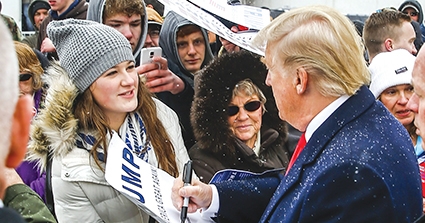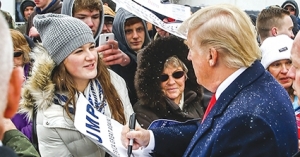Iowa Caucuses: Cruz Smacks Donald Trump, Democrats ‘Feel the Bern’
It feels like election season has been going on forever in the US. In reality, the primaries began on Monday, February 1 in Iowa. The “Hawkeye State” has a population of only 3 million (less than 1 percent of the US population), so its voters are a small sample of the United States. A study from 2012 showed that the winner of the Iowa Democratic caucus goes on to win the party nomination roughly 50 percent of the time, while the GOP caucus picks the nominee 43 percent of the time.
Nevertheless, the Iowa caucuses mark the official grand opening of election season. This time, the results brought up several unexpected headlines.
Ted Cruz Leads Republican Pack
The Iowa Republican caucus was won by an outsider, but not the outsider that entry polls projected. Ted Cruz, the Texas freshman senator and architect of the 2013 government shutdown – a move that apparently served no purpose other than to raise his national profile – led the GOP with 27.7 percent of the vote.
“Tonight is a victory for the grassroots,” Cruz declared as he claimed the win Monday night. Reports from Iowa credit his team’s diligent groundwork for the strong showing. His campaign had 11,986 volunteers working across the state in addition to a full team of staffers. Plus, religious messages –a specialty of this fiery evangelical Christian – tend to play well in front of audiences in Iowa.
“The Donald” Disappoints
Manhattan billionaire Donald Trump came in second among GOP candidates with 24.3 percent of the vote. If anything, the results showed that charisma and national media coverage don’t necessarily substitute for good old fashioned boots on the ground. Trump took a hands-off approach, with few paid advertisements and only 12 staffers.
Trump’s loss – despite being favored by seven points over Cruz in entry polls – is an indicator of the gap between expressing support in an opinion poll and actually going out to vote. That’s where a strong grassroots organization comes in – an area in which Trump failed, and Cruz succeeded.
Rubio Breathes Life into GOP Establishment
Republican elites have fretted with early polls being dominated by Trump and Cruz, two figures reviled by GOP bigwigs and influential donors. Former Florida governor Jeb Bush, the party establishment’s favored candidate, has failed to attract popular support.
The GOP establishment was redeemed on Monday by Marco Rubio, a brash, Spanish-speaking senator from Florida. Rubio came in third with 23.1 percent of the vote and gained much-needed momentum to take into the February 8 New Hampshire primary. Rubio has received criticism for his perceived lack of experience and “flip-flopping” on core issues (fellow Republican Lindsey Graham this week accused him of going “hard right” on abortion and immigration reform, issues on which Rubio had earlier shown moderation).
However, Rubio’s positive, forward-focused message and foreign policy expertise make him the strongest candidate among the GOP mainstream. If and when Bush and other GOP candidates such as Chris Christie and John Kasich drop out, the Republicans’ vast resources will consolidate around Rubio.
Hillary Clinton Wins but Still Gets “Bern’d”
Democratic front-runner Hillary Clinton officially won the Democratic Caucus with 49.9 percent of the vote. But the margin was razor thin. Vermont senator and self-professed “Democratic Socialist” Bernie Sanders trailed right behind her with 49.6, remarkable for an outsider candidate with almost no national exposure going into 2015.
Clinton’s campaign came up short in predictable ways. Despite no shortage of resources and more than 100 full-time staffers on the ground, she failed to attract many voters outside her base of older, regular caucus voters. Her lack of broad appeal contrasted with Sanders’s strong support from younger, more left-wing voters.
Among 17-29 year olds, 84 percent went for Sanders, compared to only 14 percent for Clinton. Sanders also held a 19 point edge over Clinton among voters who described themselves as “very liberal,” a group comprising more than a quarter of the Democratic base.
Can’t Buy Me Love (Or Votes)
That money buys power in American politics is a common assumption these days. The 2016 Iowa caucuses showed that things may not be so bad, after all. The Bush campaign spent USD 14.9 million on advertisements but received only 5,238 votes, or about USD 2,800 for each vote earned. By contrast, the Rubio campaign spent USD 273, Cruz USD 116, and Trump only USD 73.
On the Democratic side, Clinton spent a full USD 2 million more than Sanders (USD 9.4 million to USD 7.4 million), but earned only four more delegates.
Joseph Larsen












